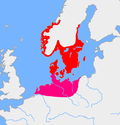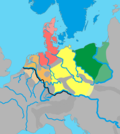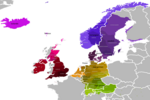In the Germanic languages, weak verbs are by far the largest group of verbs, and are therefore often regarded as the norm (the regular verbs). They are...
60 KB (5,117 words) - 07:44, 14 March 2024
off of Proto-Germanic. In modern English, as in all modern Germanic languages, weak verbs outnumber strong verbs. The "strong" vs. "weak" terminology...
125 KB (12,200 words) - 18:20, 7 April 2024
being non-finite). Germanic verbs fall into two broad types, strong and weak. Elements of both are present in the preterite-present verbs. Despite various...
29 KB (2,932 words) - 16:56, 19 April 2024
Look up weak verb in Wiktionary, the free dictionary. Weak verb may refer to: Germanic weak verb, verbs in Germanic languages that form their preterites...
554 bytes (115 words) - 07:21, 12 January 2017
Germanic weak and strong groups – although historically some verbs have moved between these groups. There are also a few anomalous cases: the verbs be...
38 KB (4,857 words) - 23:51, 8 April 2024
example of the latter is provided by the strong and weak verbs of the Germanic languages; the strong verbs inherited their method of making past forms (vowel...
18 KB (2,546 words) - 23:26, 15 May 2024
Verbs in Proto-Germanic were divided into two main groups, called "strong" and "weak", according to the way the past tense is formed. Strong verbs use...
130 KB (12,128 words) - 02:05, 16 May 2024
verbs). A few underived verbs that were originally strong j-present verbs acquired weak past tenses in Proto-Germanic. Weak verbs were divided into five...
59 KB (6,256 words) - 20:49, 13 April 2024
strong verbs to become weak. As German is a Germanic language, the German verb can be understood historically as a development of the Germanic verb. The...
44 KB (5,751 words) - 08:43, 21 May 2024
Old English grammar (redirect from Old English verb)
only four verbs. By the Old English period, new class I weak verbs had stopped being produced, but so many had been coined in Proto-Germanic that they...
84 KB (8,372 words) - 23:02, 21 May 2024
preserved as Germanic *furskōną, which was no longer a simple thematic verb, but had been extended with the class 2 weak suffix -ō-. Stative verbs became the...
82 KB (7,771 words) - 13:34, 25 March 2024
Look up strong verb in Wiktionary, the free dictionary. Strong verb may refer to: Germanic strong verb, a verb that marks its past tense by means of changes...
463 bytes (103 words) - 07:10, 12 January 2017
relic weak verbs in Class III.[citation needed] Some varieties of Upper German, like Alemannic and Swabian, also share features with North Sea Germanic languages...
10 KB (1,100 words) - 23:36, 10 May 2024
tense. The vast majority of verbs in all Germanic languages are weak; the remaining verbs with vowel ablaut are the strong verbs. The distinction has been...
92 KB (9,397 words) - 22:20, 10 May 2024
A modal verb is a type of verb that contextually indicates a modality such as a likelihood, ability, permission, request, capacity, suggestion, order,...
13 KB (1,487 words) - 00:51, 26 April 2024
conjugation of Germanic strong verbs such as sing/sang/sung. While Germanic umlaut has had important consequences for all modern Germanic languages, its...
52 KB (5,283 words) - 23:04, 25 March 2024
Appendix:English modal verbs in Wiktionary, the free dictionary. The English modal auxiliary verbs are a subset of the English auxiliary verbs used mostly to...
82 KB (9,946 words) - 06:39, 2 May 2024
traditional grammar of Modern English, a phrasal verb typically constitutes a single semantic unit consisting of a verb followed by a particle (examples: turn down...
25 KB (3,059 words) - 16:53, 22 May 2024
strongly influenced by the status of the verb at hand. The perfect and the passive participles of strong verbs in Germanic languages are irregular (e.g. driven)...
13 KB (1,279 words) - 00:40, 3 April 2024
Grammatischer Wechsel (category Germanic languages)
paradigm of a Germanic verb. According to Grimm's law, the Proto-Indo-European (PIE) voiceless stops *p, *t, *k and *kʷ usually became Proto-Germanic *f, *θ...
12 KB (1,316 words) - 09:12, 25 November 2023
Gothic verbs have the most complex conjugation of any attested Germanic language. Most categories reconstructed for the Proto-Germanic verb system are...
48 KB (1,898 words) - 22:42, 10 August 2023
verbs Germanic verbs Hebrew verb conjugation Hungarian verbs Ilokano verbs Irish verbs Italian verbs Japanese godan and ichidan verbs Japanese verb conjugations...
20 KB (2,580 words) - 15:37, 11 May 2024
Suppletion (redirect from Suppletive verb)
the verb minema ‘to go’ were originally those of a verb cognate with the Finnish lähteä ‘to leave’, except for the passive and infinitive. In Germanic, Romance...
39 KB (2,641 words) - 12:35, 17 April 2024
affairs in Proto-Germanic. The verb may be combined with various prepositions to form phrasal verbs such as "go around" and "go off". The verb go is used to...
11 KB (1,278 words) - 16:19, 20 March 2024
irregular verbs, see English irregular verbs. Many of these can be classed as Germanic strong verbs, such as sing (past sang), while others are weak verbs with...
37 KB (5,127 words) - 15:07, 3 May 2024
Old Norse morphology (redirect from Old Norse verbs)
Old Norse has three categories of verbs (strong, weak, & present-preterite) and two categories of nouns (strong, weak). Conjugation and declension are...
69 KB (4,986 words) - 05:42, 6 January 2024
Dutch language (category Subject–object–verb languages)
in syntax and verb morphology (for verb morphology in English verbs, Dutch and German, see Germanic weak verb and Germanic strong verb). Grammatical cases...
189 KB (18,823 words) - 02:22, 18 May 2024
Dutch conjugation (redirect from Dutch verbs)
a verb's conjugation and therefore are complementary to each other. Dutch verbs can be grouped by their conjugational class, as follows: Weak verbs: past...
41 KB (4,392 words) - 15:25, 11 April 2024
relation to Germanic verbs. In this context, "strong" indicates those verbs that form their past tenses by ablaut (the vocalic conjugations), "weak" those...
4 KB (582 words) - 16:07, 5 April 2022
Weak nouns are nouns that follow a weak inflection paradigm, in contrast with strong nouns. They are present in several Germanic languages. Modern English...
4 KB (590 words) - 20:15, 5 February 2024





